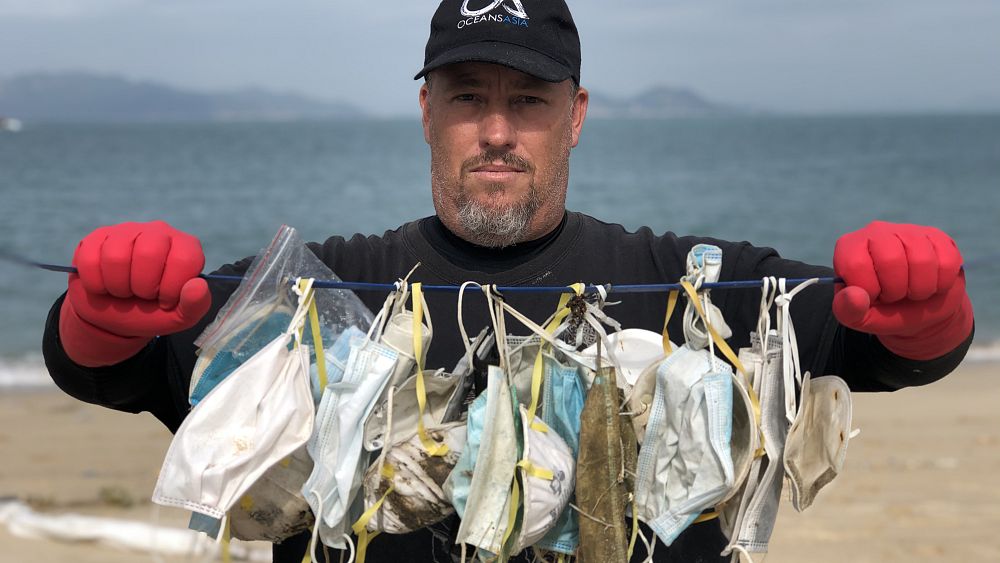
COVID-19 unleashed a global arms race for personal protective equipment (PPE) as governments fight to protect front-line workers.
But if no one disputes the current emergency, activists fear that a new epidemic is worsening: plastic pollution.
The UN estimates that 13 million tonnes of plastic are thrown into the sea each year and that half of the plastic produced in the world is for single use.
In the Mediterranean, 570,000 tonnes of plastic are dumped each year, the equivalent of 33,800 plastic bottles per minute, according to WWF.
Italy, when the closure phase is lifted, will need a billion masks and half a billion gloves per month, according to estimates from the École Polytechnique from Turin.
According to a WWF report"If only 1% of the masks were improperly disposed and dispersed in the wild, it would result in up to 10 million masks a month polluting the environment."
"Since the weight of each mask is about 4 grams, this would cause more than 40,000 kilograms of plastic to be dispersed into the wild," said the report.
Much of the PPE used to protect healthcare workers, such as gloves, masks and gowns, is used once before being thrown away.
This is the case even if there is no scientific evidence that single-use plastics are better than reusable plastics, said Kevin Stairs, director of chemical and pollution policy at Greenpeace.
"When we reuse a PPE, we disinfect it. With single-use products, the item is packaged, escapes from the system and can carry the Sars-CoV-2 virus for days on its surface. "
Is the circular economy the answer?
"Waste in the sea is generated by the way we dispose of PPE and plastic in general, not by the use itself," said Richard Thompson, a professor of marine biology at the University. of Plymouth, who first coined the term "microplastics" in 2004
"(Governments) ask all citizens to walk with a mask, but this should not create waste."
"Given the crisis and the immense pressure we are facing right now, we should not delay the delivery of the EPP to everyone now.
"But at the same time, if these products are used on the street, we need to advise people on how to get rid of them."
Thompson argues that proper product design in the first place could help control the amount of waste in the ocean. This philosophy is the foundation of the circular economy, which seeks to create items that are easier to recycle.
Take for example face masks imported from China. Experts say they are made up of several layers of different materials or polymers. This complexity makes it much more difficult to recycle these items.
"Countries should try to develop products made from the same polymer, which we can trace and collect in sealed disposable containers, where they can be disinfected and recycled," said Claudia Brunori, chemist at the Italian government agency for new technologies, energy and sustainable economic development (ENEA)
.
This occurs on a small scale at the local level, where NGOs, institutions and researchers have created reusable PPE, where the mask structure is preserved and only the filter is discarded.
Is the plastics industry taking advantage of the moment?
The EU introduced a set of rules for marine litter last year: directive on single-use plastics It is to become law at the national level this year.
It included a ban on common single-use plastics, such as cotton swabs, cutlery and straws. Medical masks and gloves are not covered by legislation.
The European Plastics Converters, a professional association, has already requested that EU legislation be delayed by one year due to COVID-19.
Brussels however rejected the offer.
However, there is evidence of a return to single-use plastic cups amid the COVID-19 hygiene issues, Starbucks where reusable cups have been banned.
Are biodegradable plastics the answer?
The European Commission is developing standards for biodegradable plastics, but even if PPE were made from these materials, it would not be a quick fix for marine pollution, it is said.
"Biodegradable plastic solutions alone are not enough to reduce marine litter," said Virginia Janssens, managing director of PlasticsEurope, an association representing plastics manufacturers.
"The most important thing is that PPE and all waste must be disposed of properly, as directed by the authorities."
Professor Thompson said: "The degradation rates depend on many different factors. It depends on the type of polymer used, but in deep water, where it is cold and dark, it will be different from a range.
"A recent study on biodegradable plastic exposed to different environments has shown that some items disappear quickly, while they could still be purchased in some of these bags after four years at sea. By the time they reach the sea, there is too late. "
Table of Contents Download



